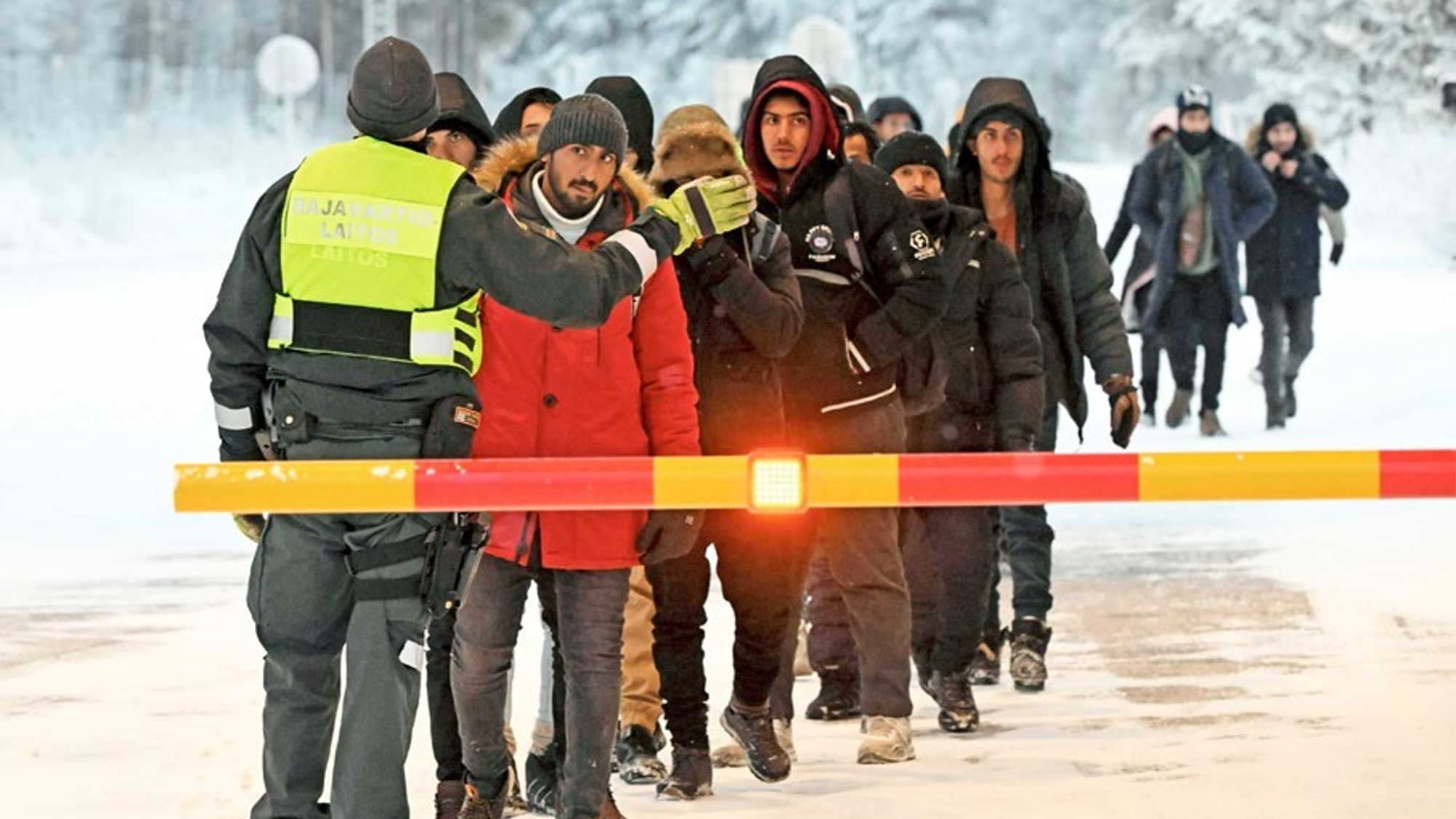Russia's 'grey zone' tactics in Finland’s snowy forests
Tensions have risen between the two countries ever since Finland applied to join Nato last May

A free daily email with the biggest news stories of the day – and the best features from TheWeek.com
You are now subscribed
Your newsletter sign-up was successful
Another crisis involving an influx of migrants is building up on Europe's border, said Christiane Kühl on Merkur.de (Munich). But this one isn't in the Mediterranean: it's occurring along the frozen stretches of the 832-mile frontier between Finland and Russia.
From August to December last year, more than 1,300 refugees from nations such as Yemen, Somalia and Syria crossed into Finland (before that it had been an average of just one a day); thousands more are expected when spring arrives. It's all part of Russia's plan to destabilise its neighbour. The tensions between the two countries have a long history, but in April last year they escalated dramatically when Finland joined Nato, and have risen ever since. Using migrants as a weapon is a classic case of Russia using "grey-zone tactics" against a Nato state – a ruse somewhere between political pressure and physical aggression.
Finland's firm stance
In response, Finland closed all its border crossings in November, said Elisabeth Braw on Politico (Brussels). However, "like any responsible democratic government", it put a time limit of two weeks on the closure, hoping that would deter Moscow from doing the same again. Yet when it reopened two crossings in December, the migrants started pouring in again. So now, as well as shutting all of its crossing points, it's stepping up patrols using heat sensors and drones to stop them crossing through the woods. But it's not easy picking them up in freezing, inhospitable woodland in the depths of winter, so last year work started on a 124-mile, ten-foot-high barbed wire fence along a sensitive part of the border. This has badly hit the many Finns needing to travel to Russia, in particular ethnic Russians living in Finland, some of whom have held protests to "voice their anger" over Helsinki's handling of the dispute.
The Week
Escape your echo chamber. Get the facts behind the news, plus analysis from multiple perspectives.

Sign up for The Week's Free Newsletters
From our morning news briefing to a weekly Good News Newsletter, get the best of The Week delivered directly to your inbox.
From our morning news briefing to a weekly Good News Newsletter, get the best of The Week delivered directly to your inbox.
Finland's firm stance also risks undermining its image as a liberal nation that follows international asylum conventions, said Erika Solomon in The New York Times. But Helsinki had no choice. Finnish guards say the migrants are either forced across the border or given bicycles to encourage them to cross it.
Russia the 'unstable giant'
The long border has shaped Finland's relations with Russia, said Laura Saarikoski in Helsingin Sanomat (Helsinki). It sees its neighbour as an "unstable giant" to be mollified when possible, but to be guarded against in readiness for those times when a "bout of delirium" overtakes the Kremlin. And until Russia invaded Ukraine, Finland relied on its own resources for its security, said Andrea Prada Bianchi in Foreign Policy (Washington). From the end of the Second World War up to last April it had kept militarily neutral, while developing the strongest artillery in western Europe and making military service mandatory for school leavers.
Fully 900,000 of its 5.5 million people have had military training, and it now boasts a wartime troop strength of 280,000. Nato membership ended that self-reliance, but not Finland's resolve to remain well-equipped: it recently bought a high-altitude air-defence system from Israel and 64 F-35 jets from the US. It also plans to open 300 new shooting ranges to help citizens develop their shooting skills, said IceNews (Reykjavik). And Finns are responding to the initiative: enrolment in voluntary defence courses has doubled since the Ukraine invasion, and there has been a huge increase in applications for gun licences.
The number of migrants arriving in Finland is tiny compared to those reaching southern Europe, but 80% of Finns still back the decision to close the border, said Julian Gomez on Euronews (Brussels). That support has emboldened the government, a coalition led by conservatives and the far-right, to look at even tougher ways of dealing with migrants, not least joining with other Nordic countries in chartering repatriation flights. Yet this is a problem that isn't going to go away, said Ilta-Sanomat (Helsinki). The border is due to reopen in mid-April, by which time snow will be melting and Finland's new president, the former prime minster Alexander Stubb, will have taken office. Don't be surprised if Vladimir Putin decides to "test his nerves".
A free daily email with the biggest news stories of the day – and the best features from TheWeek.com
-
 The ‘ravenous’ demand for Cornish minerals
The ‘ravenous’ demand for Cornish mineralsUnder the Radar Growing need for critical minerals to power tech has intensified ‘appetite’ for lithium, which could be a ‘huge boon’ for local economy
-
 Why are election experts taking Trump’s midterm threats seriously?
Why are election experts taking Trump’s midterm threats seriously?IN THE SPOTLIGHT As the president muses about polling place deployments and a centralized electoral system aimed at one-party control, lawmakers are taking this administration at its word
-
 ‘Restaurateurs have become millionaires’
‘Restaurateurs have become millionaires’Instant Opinion Opinion, comment and editorials of the day
-
 Democrats push for ICE accountability
Democrats push for ICE accountabilityFeature U.S. citizens shot and violently detained by immigration agents testify at Capitol Hill hearing
-
 Fulton County: A dress rehearsal for election theft?
Fulton County: A dress rehearsal for election theft?Feature Director of National Intelligence Tulsi Gabbard is Trump's de facto ‘voter fraud’ czar
-
 ‘Melania’: A film about nothing
‘Melania’: A film about nothingFeature Not telling all
-
 Greenland: The lasting damage of Trump’s tantrum
Greenland: The lasting damage of Trump’s tantrumFeature His desire for Greenland has seemingly faded away
-
 Minneapolis: The power of a boy’s photo
Minneapolis: The power of a boy’s photoFeature An image of Liam Conejo Ramos being detained lit up social media
-
 The price of forgiveness
The price of forgivenessFeature Trump’s unprecedented use of pardons has turned clemency into a big business.
-
 The ‘mad king’: has Trump finally lost it?
The ‘mad king’: has Trump finally lost it?Talking Point Rambling speeches, wind turbine obsession, and an ‘unhinged’ letter to Norway’s prime minister have caused concern whether the rest of his term is ‘sustainable’
-
 ICE: Now a lawless agency?
ICE: Now a lawless agency?Feature Polls show Americans do not approve of ICE tactics